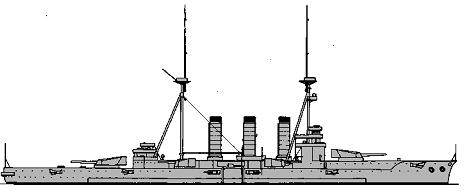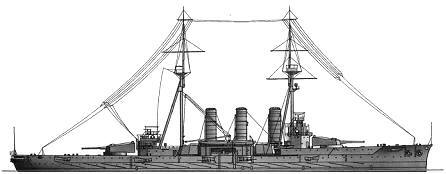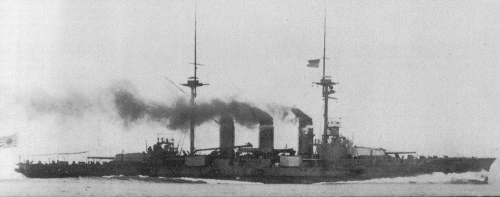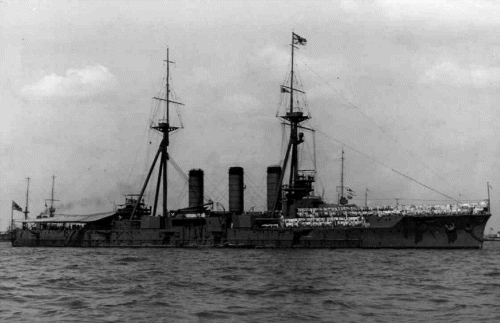

Kurama 1912

Kurama 1914
| Name | No | Yard No | Builder | Laid down | Launched | Comp | Fate |
| 伊吹 [Ibuki] | Kure K K | 22.5.1907 | 21.11.1907 | 1.11.1909 | for disposal 9.1923 | ||
| 鞍馬 [Kurama] | Yokosuka K K | 23.8.1905 | 21.10.1907 | 28.2.1911 | for disposal 1923 |
|
Displacement normal, t |
14636 |
|
Displacement full, t |
15595 |
|
Length, m |
147.8 |
|
Breadth, m |
23.0 |
|
Draught, m |
8.00 |
|
No of shafts |
2 |
|
Machinery |
Ibuki: 2 Curtis steam turbines, 18 Miyabara boilers Kurama: 2 VTE, 28 Miyabara boilers |
|
Power, h. p. |
Ibuki: 24000 Kurama: 22500 |
|
Max speed, kts |
Ibuki: 21.5 Kurama: 20.5 |
|
Fuel, t |
Ibuki: coal 2000 + oil 218 Kurama: coal 1868 + oil 200 |
| Endurance, nm(kts) | 9000(10) |
|
Armour, mm |
belt: 178 - 102, upper belt: 127, 12`` barbettes: 178 - 127, 12`` turrets: 178 - 127, 8`` turrets: 152, casemates: 127, deck: 76, CT: 203 |
|
Armament |
2 x 2 - 305/45 41-shiki, 4 x 2 - 203/45 41-shiki, 14 x 1 - 120/40 41-shiki, 4 x 1 - 76/40 41-shiki, 3 - 450 TT (1 bow, 2 beam) |
|
Complement |
844 |
Project history: Cruisers with very heavy artillery, but relatively slow speed. Frequently they were classified as battleships with the facilitated armour protection: to a certain extent it is possible to consider them as "relatives" of Russian Peresvet class battleships.
The project was developed on the basis of armoured cruiser Tsukuba. Originally Ibuki and Kurama should be identical, but for the former ship Curtiss steam turbines were ordered in spring 1906, and project should be redesigned thoroughly. Officially Ibuki has been laid down 22.5.1907, but her building has begun earlier. Ibuki became the first Japanese turbine-driven ship, but it has not made her faster: on trials Kurama has reached 21.5kts at 23081hp, and Ibuki made 21.16kts at 28977hp. Outwardly both ships differed by masts: Kurama had tripod ones and Ibuki had usual pole masts.
Ship protection: Krupp steel. Main belt, extended to 1.2m under wl, was 178mm between barbettes and 102mm at ship ends. The upper belt between barbettes was 127mm, casemates had also 127mm protection. Main barbettes and turrets had 178mm armour, secondary turrets had 152mm. There were main CT with 203mm sides and aft CT with 152mm sides. Protected deck was 51mm amidships and 76mm at ship ends.Modernizations: None.
Naval service: In the First World War beginning Ibuki participated in chase for Spee squadron, and then escorted military transports from Australia to Suez. Both ships have been disarmed after Washington conference and broken up in 1924-1925.

Ibuki 1909

Kurama
© Ivan Gogin, 2008-14